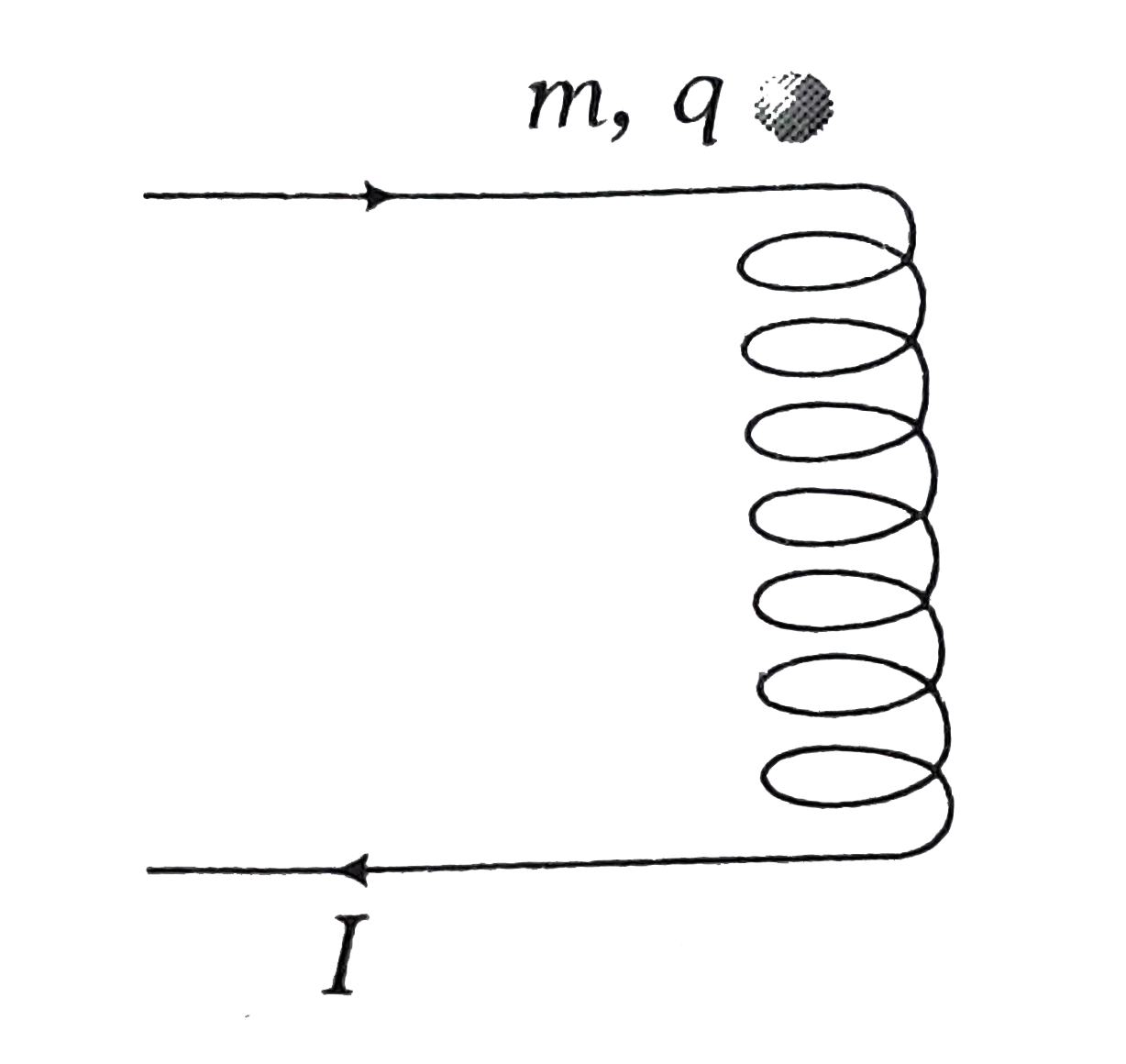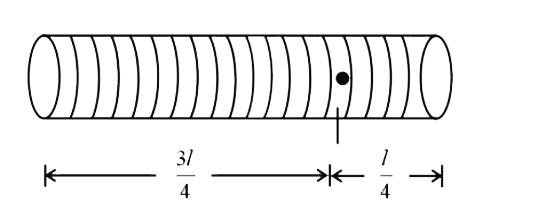A tightly-wound, long solenoid has n turns per unit length, a radius r and carries a current i. A particle having charge q and mass m is projected from a point on the axis in a direction perpendicular to the axis. What can be the maximum speed for which the particle does not strike the solenoid?Solution in Gujrati
Given current in solenoid =i
Number of turns per unit length = n
Radius of circule =r2
We know that mV2R=qVB
rArr V = (qBR)/(m) = (qmu_(0) nir)/(2m).
Topper's Solved these Questions
- MAGNETIC FIELD DUE TO CURRENTBOOK - HC VERMACHAPTER - MAGNETIC FIELD DUE TO CURRENTEXERCISE - Objective 2
7 Videos
- MAGNETIC FIELDBOOK - HC VERMACHAPTER - MAGNETIC FIELDEXERCISE - Exercises
61 Videos
- MAGNETIC PROPERTIES OF MATTERBOOK - HC VERMACHAPTER - MAGNETIC PROPERTIES OF MATTEREXERCISE - Exercises
9 Videos
Similar Questions
The magnetic field at the origin due to a current element I (→dl) placed at a positon (→r) is
View SolutionAn alpha particle is projected vertically upward a speed of 3.0X104kms−1 in a region where a magnetic field of magnitude 1.0 T exists in the direction south to north. Find the magnetic force that acts on the a particle.
View SolutionThe magnetic intensity H at the centre of a long solenoid carrying a current of 2.0A, is found to be 1500Am−1. Find the number of turns per centimetre of the solenoid.
View SolutionA tightly-wound, long solenoid has n turns per unit length, a radius r and carries a current i. A particle having charge q and mass m is projected from a point on the axis in a direction perpendicular to the axis. What can be the maximum speed for which the particle does not strike the solenoid?
View SolutionA long solenoid has a radius a and number of turns per unit length is n . If it carries a current i, then the magnetic field on its axis is directly proportional to
View SolutionA long solenoid carrying a current I is placed with its axis vertical as shown in the figure. A particle of mass m and charge q is released from the top of the solenoid. Its acceleration is (g being acceleration due to gravity)

View SolutionThere is a long solenoid of radius 'R' having 'n' turns per unit length with current i flowing in it. A particle having charge 'q' and mass 'm' is projected with speed 'v' in the perpendicular direction of axis from a Point on its axis. Find maximum value of 'v' so that it will not collide with the solenoid.
View SolutionThe magnetic field on the axis of a long solenoid having n turns per unit length and carrying a current is
View SolutionA solenoid carrying 1 A current has a length of 1 m and contains 10000 turns. What is the magnetic field on the axis of the solenoid ?
View SolutionA solenoid of radius R has n turns per unit length, then the self-inductance of the solenoid per unit length is
View SolutionA tightly wound solenoid of radius 'a' and length 'l' has n turns per unit length. It carries an electric current i. Magnetic field at a distance l4 from one of the end (inside the solenoid on its axis) is B=μ0ni(√5+3)√K for l=4a. Then find the value of K.

View SolutionThere is one long solenoid with turns per unit length. The radius of the solenoid is R and current flowing through it is I. There is a charged particle having charge q and mass m projected from a point on axis of the solenoid, and in a direction perpendicular to the axis. Find the maximum possible speed with which the charged particle can be projected so as not to strike the solenoid.
View SolutionA tightly-wound, long solenoid has n turns per unit length, a radius r and carries a current i. A particle having charge q and mass m is projected from a point on the axis in a direction perpendicular to the axis. What can be the maximum speed for which the particle does not strike the solenoid?
View SolutionA tightly-wound, long solenoid has n turns per unit length, a radius r and carries a current i. A particle having charge q and mass m is projected from a point on the axis in a direction perpendicular to the axis. What can be the maximum speed for which the particle does not strike the solenoid?
View SolutionA long solenoid carrying a current I is placed with its axis vertical as shown in the figure. A particle of mass m and charge q is released from the top of the solenoid. Its acceleration is (g being acceleration due to gravity)

View SolutionA short solenoid (length l and radius r, with n turns per unit length) lies well inside and on the axis of a very long, coaxial solenoid (lengthL, radius R and N turns per unit length, with R>r). Current I flows in the short solenoid. Choose the correct statement
View Solution
